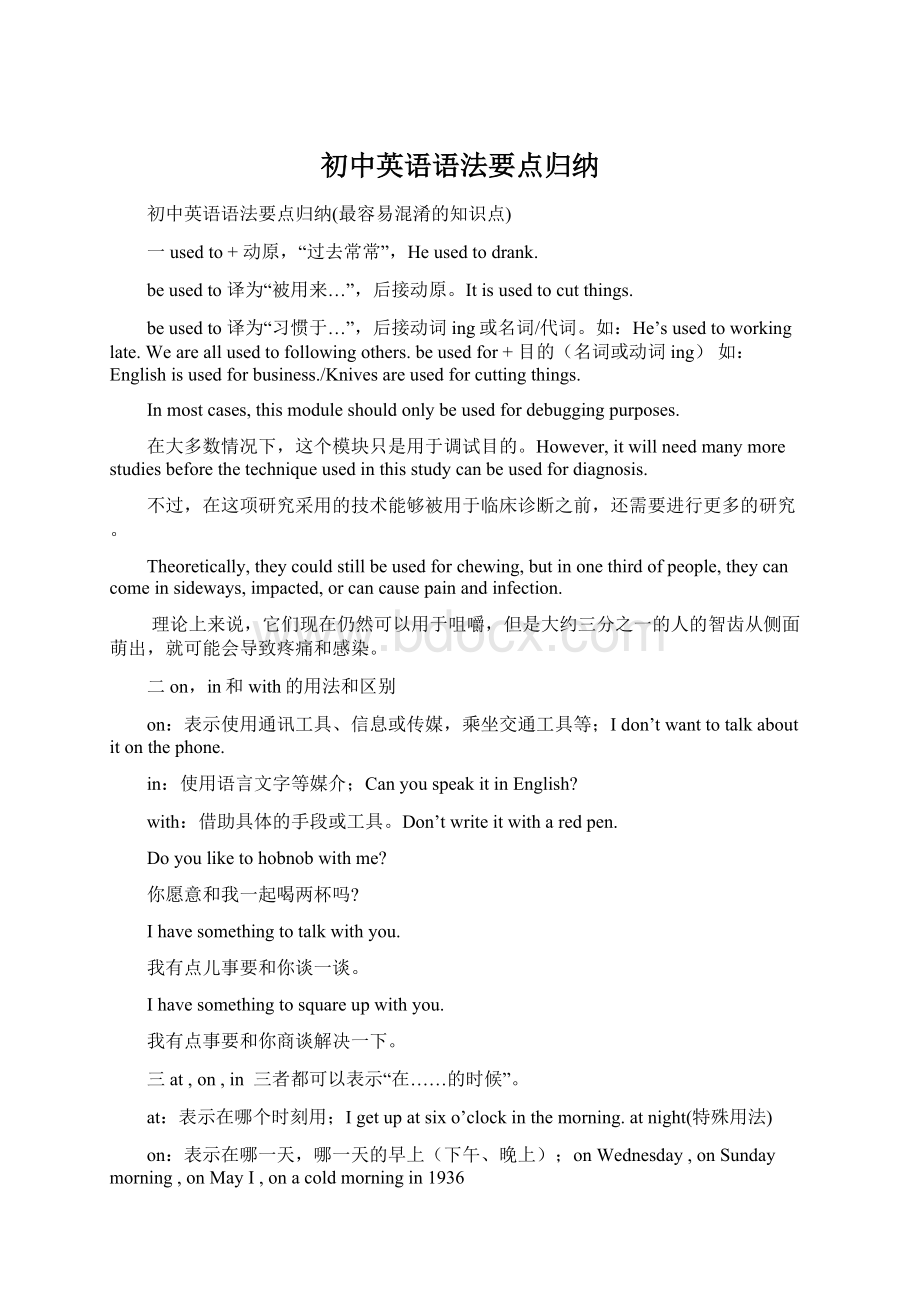初中英语语法要点归纳.docx
《初中英语语法要点归纳.docx》由会员分享,可在线阅读,更多相关《初中英语语法要点归纳.docx(16页珍藏版)》请在冰豆网上搜索。

初中英语语法要点归纳
初中英语语法要点归纳(最容易混淆的知识点)
一usedto +动原,“过去常常”,Heusedtodrank.
beusedto 译为“被用来…”,后接动原。
Itisusedtocutthings.
beusedto 译为“习惯于…”,后接动词ing或名词/代词。
如:
He’susedtoworkinglate.Weareallusedtofollowingothers.beusedfor +目的(名词或动词ing)如:
Englishisusedforbusiness./Knivesareusedforcuttingthings.
Inmostcases,thismoduleshouldonlybeusedfordebuggingpurposes.
在大多数情况下,这个模块只是用于调试目的。
However,itwillneedmanymorestudiesbeforethetechniqueusedinthisstudycanbeusedfordiagnosis.
不过,在这项研究采用的技术能够被用于临床诊断之前,还需要进行更多的研究。
Theoretically,theycouldstillbeusedforchewing,butinonethirdofpeople,theycancomeinsideways,impacted,orcancausepainandinfection.
理论上来说,它们现在仍然可以用于咀嚼,但是大约三分之一的人的智齿从侧面萌出,就可能会导致疼痛和感染。
二on,in和with的用法和区别
on:
表示使用通讯工具、信息或传媒,乘坐交通工具等;Idon’twanttotalkaboutitonthephone.
in:
使用语言文字等媒介;CanyouspeakitinEnglish?
with:
借助具体的手段或工具。
Don’twriteitwitharedpen.
Doyouliketohobnobwithme?
你愿意和我一起喝两杯吗?
Ihavesomethingtotalkwithyou.
我有点儿事要和你谈一谈。
Ihavesomethingtosquareupwithyou.
我有点事要和你商谈解决一下。
三at,on,in 三者都可以表示“在……的时候”。
at:
表示在哪个时刻用;Igetupatsixo’clockinthemorning.atnight(特殊用法)
on:
表示在哪一天,哪一天的早上(下午、晚上);onWednesday,onSundaymorning,onMayI,onacoldmorningin1936
in:
表示在哪一年(季、月),在上午,下午等。
inSeptember,inthemorning,intheafternoon,inautumn
四spend, pay, cost, take的用法和区别sb.spend…onsth. 某人花了…(时间、金钱)在某事上。
Sb.spend…. (in)doingsth.某人花了…(时间、金钱)做某事。
Weshouldnotspendourfortune.
我们不能浪费钱财。
Youreallyshouldn'tspendsomucheffortonit.
你真不该在这件事上花费这么大的精力。
Heusedtospendallhismoneyonfoodanddrink;nowhelivesasimplelife.
他过去把钱都花在吃喝儿上,现在可节省了。
sb.pay…forsth. 某人为某物花了…钱。
Wewillnotpayforyourcrisis.
我们不会为你们的危机付款。
Allthismaybethepricewepayforprogress.
这一切都可能是我们为进步付出的代价。
I'llsettlewithyou,youhavetopayforyourinsulting.
我早晚要找你算这笔账的,你得为你的侮辱行为付出代价。
sth.costsb.… 某物花了某人…钱。
Didyoureckoninthecostofthetaxi?
你把坐计程车的费用计算在内了吗?
Theydeductedthecostofthebrokenwindowfromhisallowance.
他们从他的津贴中扣除损坏窗户的费用。
Wehavetoweighthecostofthenewsystemagainstthebenefitsitwillbring.
我们必须权衡一下起用新系统所需的成本和它将带来的效益。
Ittakes/tooksb.…todosth. 花了某人…(时间、金钱)做某事
五toomuch. toomany, muchtoo的用法和区别
toomuch +不可数名词
Theybumpedheroffbecausesheknewtoomuch.
因为她知道太多,所以他们把她干掉了。
Seeingtoomuchviolenceontelevisioncandesensitizepeopletoit.
在电视上看太多暴力,会使人对暴力麻木不仁。
Theybumpedhimoffbecauseheknewtoomuchabouttheirillegalactivities.
他们把他谋杀了,因为他对他们的非法活动知道得太多了。
toomany +可数名词 :
Theyhavetoomanyrestrictions. 他们有很太多的限制。
Onereasonformydecisionwasthatalltoomanypeopleadvisedmenottodoit.
我之所以做出这样的决定,原因之一就是有太多的人不想让我来这里。
Versatilityisanotherofyourstrongpoints,butdon'toverdoitbyhavingtoomanyironsinthefire.
你还有一个长处是多才多艺,但不要揽事太多而太露锋芒。
muchtoo +形容词 很,非常….
OneofthebigmistakesthatIthinkpeoplemakeistodotoomuchtoosoon.
我认为人们常犯的一个大的错误就是在太短的时间里做得太多了。
Look,"hesaidtohispeople,"theIsraeliteshavebecomemuchtoonumerousforus.
对他的百姓说:
“看哪,这以色列民比我们还多,又比我们强盛。
Forexample,alloftheseelementsareunlikelytobeimplementedasasinglecomponent,sincethey'remuchtoocomplicatedforthistobethecase.
例如,所有这些元素都不可能作为一个单一的组件被实现,但是这对于一个用例来说太过复杂了。
六not…until,until 的区别和用法
until表示动作、状态的持续,强调“一直到……为止”,或强调某个动作或状态一直持续到另一个动作或状态出现之前。
常与表示延续性动作的动词连用。
如:
Hebangedonthedooruntilshelethimin.
他砰砰打门,一直到她开门让他进去为止。
Sheporedovertheproblemuntilshesolvedit.
她深入地思考了这个问题,直到把它解决为至。
Theletterpassedfromonetoanotheruntileveryonehadreadit.
这封信从一个人转手到另一个人直到每个人都看过。
not…until表示“到……为止;直到……才”,常与表示瞬间性动作的动词连用。
Notuntilwepointedouttheirfaulttothemdidtheyrealizeit.
直到我们向他们指出了他们的错误,他们才意识到。
We'llneverfindTruthinherentirety,atleastnotuntiltheSecondComing,andwhoknowswhenthatwillbe?
我们永远找不到完整的真理,至少在第二次到来之前不能,谁知道那将是什么时候呢?
Thereforeletusrealizethatitisnotuntilwehavecultivatedthebetterqualitiesinourselvesthatwecanexpecttofindtheminothers.
因此,我们要意识到在我们自己身上培养出更好的品质之前,我们不能希望在其他人的身上找到这样的品质。
七few, afew; little, alittle的用法和区别
(1)few,afew是可数的,little,alittle是不可数的。
(2)afew,alittle含肯定意味,few,little含否定意味。
Imetfewpeoplecongenialtomeinthedepartment.
在那个单位里我没碰到几个意气相投的人。
Thethiefmoochedfewappleswhenwearenotlooking.
那个小偷乘我们不注意偷了几个苹果。
Yearbyyearafewoftheseslangtermsprovesousefulthattheygraduateintorespectablesociety.
年复一年,这些俚语中的一些证明是十分有用的,因而逐渐进入了上流社会。
Theyhavealittleink,don'tthey?
他们有一点墨水,是吗?
Theyhavelittleink,dothey?
他们几乎没有墨水,是吗?
ShehasafewChinesefriends,doesn'tshe?
他有几位中国朋友,是吗?
ShehasfewChinesefriends,doesshe?
他几乎没有几位中国朋友,是开吗
Shehasalittledog. 她有一只小狗。
八can, beableto 表示能力这一意义时can和beableto基本相同,但can只有两个时态即现在时(can)与过去时(could)而beableto有多种形式。
对未来的能力做决定时,一般用can.用于过去时态时,
Seeifyoucangowithus. 考虑一下,看是否能和我们一起去。
WhatcanIdoforyou?
我能帮你什么忙吗?
Doithowyoucan. 你尽可能试着做做看。
beableto与can意义不完全相同,wasableto意为“有这种能力,而且利用这种能力设法做成了某事”,而could只单纯地表达有某种能力。
Iknowsomeonewhoshouldbeabletofixyouup.
我知道有个人能提供你所需要的东西。
Manufacturersmustbeabletojuggledemandsofallkinds.
制造商必须能够应付各种需求。
Foronceyouhavemasteredthatyouwillbeabletodoanything.
因为一旦你掌握了它你将可以做到任何事情。
九must, haveto 的用法和区别
must 表示说话人的主观看法;Thenyoumustbemycousin. 那么你一定是我的远亲了。
Youmustcompensatemeforthisloss. 你必须补偿我的这个损失。
Wemuststartatonce. 我们必须马上出发。
而haveto则表示客观需要。
mustn't意为"不可以;不允许";don'thaveto意为"不必"。
Youhavetoconsiderwhattodonext. 你必须考虑下一步该做什么。
Ihavetocomplaintothemanageraboutit. 对这件事我不得不向经理申诉。
Youhavetokeepafteryoursonifherefusestobehousebroken.
如果你儿子不服管教的话,你必须整天跟在他的身边。
十after, in的用法和区别
after+时间段 表达过去一段时间以后,常用于过去时态的句子;
Ireceivedtheletteraftertwodays. 我是两天以后收到这封信的。
Afteryouleft,weallmissedyou. 你走了以后,我们都很想你。
HeheadedformeafterIcalledhim. 叫了他一声之后,他朝我走过来了。
AfterItoldherthenews,shestaredatmeinastonishment.
我把消息告诉她之后,她惊骇得睁大了眼睛盯着我。
after+时间点表示将来一段时间以后,用于将来时态的句子。
Hewillarriveafterfouro’clock.四点之后他将到来。
in+时间段 以现在为起点,表示将来一段时间以后,常用于将来时态的句子。
Youwillreceivetheletterinthreedays. 你三天以后将收到这封信。
十一ago, before的用法和区别
ago 立足于现在,表示从现在起,若干时间之前;ago通常与一般过去时连用不能与完成时连用;
Imethimthreeyearsago.(距今)三年前,我遇到他。
Imetheronceseveralyearsago. 几年前我曾见过她一面。
Theycheckedouttenminutesago. 他们十分钟前就结账走了。
Heandhiswifebustedupthreemonthsago. 他和他妻子三个月前就关系破裂了。
before 立足过去,表示从过去某一时刻起,若干时间以前。
before通常与过去完成时连用。
Ihadmethimthreeyearsbefore.(距当时)三年前我见到他一次。
Writeherbeforeyougo. 你去之前先给他写封信。
Ihaveseenhimbefore. 我以前曾经见到过他。
YoushouldhibernatebeforeIcontactwithyou. 在我与你联系之前,你得潜伏不动。
十二alone, lonely的用法和区别
alone 是表语形容词,只能作表语用。
ThoughIamalone,Iamnotlonely.虽然我孤独一人,但我并不感到寂寞.
Winkingbackhertears,sheleftalone. 她眨眨眼忍住眼泪,独自离开了。
Theyleavetheirdaughteraloneinthehouseonweekdays. 平时他们把女儿独自留在家中。
HetraversedalonethewholecontinentofAfricafromeasttowest. 他独自一人从东到西横越整个非洲大陆。
lonely 除了有“孤独的”意思外,还有“寂寞的”意思。
另外说明特点时还有“人迹稀少的”,“荒凉的”意思。
Hewastakentoalonelyhouse. 他被带到一个荒无人烟的房子内。
Iamlonelywithoutyou. 没有你,我是孤独的。
Shehasasoftplaceinherheartforalllonelypeople. 她同情所有孤独的人。
Evenifweareotherwiselonely,wegothroughlifeinthecompanyofthisever-expandingsocietyofartists,charactersandimages,eachofthemchosenbyus.
即使我们是孤独的,我们都在这个不断扩大的社会陪伴之下走完了一生,而其中的艺术家,角色与影像都是由我们自己挑选的。
十三arrive, reach, getto 三者都有“到达”之意。
reach为及物动词。
TheyreachedTianjinyesterday.昨天他们到达天津。
arrive为不及物动词,后面接介词in或at。
Wemustcleartheroombeforeourguestsarrive. 我们必须在客人到达之前把房间收拾好。
Workersinafactorymustclockinwhentheyarrive.
工厂工人到达工厂时必须记录上班时间。
YoumusthookupwithMr.Ordwayonceyouarrivethere. 你一到那儿必须马上与奥德韦先生联系。
getto常用于口语,可代替前二者。
Theyemployedthebestlawyertheycouldgettopleadtheircase.
他们聘请了能请到的最好的律师为他们陈述案情。
Youhavetoreflectonhowtoanswerhisquestionsbeforeyougettohishouse.
在你到达他家之前你必须考虑好如何回答他提出的问题。
Howdoyouplantokeepallofyourreasonsinmindsothatyoucangettowhereyouwanttobe?
你打算怎样记住自己的那些理由到达自己想要到达的地方?
我很乐意在评论里听听你的想法
十四because, becauseof “因为”
because是连词,引导状语从句。
Westayedathomebecauseitrained. 因为下雨,我们呆在家。
Ididitbecausetheyaskedmetodoit!
我做这事是因为他们请我做啊!
Theybumpedheroffbecausesheknewtoomuch. 因为她知道太多,所以他们把她干掉了。
Wecouldnotreasonoutwhichwaytherobbersescaped,becausewewereunabletofindanytraceofthem.
我们推断不出这些强盗是从哪个方向逃走的,因为我们找不到他们的任何踪迹。
becauseof是短语介词,后面接名词性词语。
Westayedathomebecauseoftherain. 因为下雨,我们呆在家。
Manymotoristswereforcedtostopoverinthattownbecauseoffloods.
由于发大水,许多开车旅游的人被迫停留在那个镇上了。
Hisbusinesswentunderbecauseofcompetitionfromthelargecorporations.
由于大公司的竞争,他的生意陷入了困境。
Becauseofthesnow,thepilothadtolandtheplaneatanairportinanothercity.
由于大雪,飞行员只得把飞机降落到另一座城市的一个飞机场。
十五begin, start “开始”一般可以通用,但start较为口语化。
Ithasbegun(started)raining. 已经开始下雨了
Sheisveryhonest,tobeginwith. 首先,她很诚实。
Beginthejobthedayaftertomorrow. 后天开始干这活吧。
Ishallcountuptotenandthenwecanbegin. 我数到十然后我们就开始。
start还可表示“动身”、“开动”等意思,而begin则不能这样用例如:
TheystartforBeijingtomorrow. 他们明天动身去北京。
Ishouldbeinstructedwhentostart. 应当通知我出发的时间。
Hewarmedtothedisabledfromthestart. 他从一开始就同情那个残疾人。
Thoughhehadagoodstart,Irowedhimdownatlast.
虽然他开始时划得很好,但最后我还是赶过了他。
十六borrow,lend 二者都有“借”的意思。
borrow是“借入”,lend是“借出”。
例如:
CanIborrowyourpen?
我可以借你的钢笔吗?
CouldIborrowyourpen?
我可以借用你的笔吗?
MayIborrowyourpen?
我可以借你的笔吗?
CouldIborrowyourbikefromyouuntilnextweek?
我借用你的自行车,直到下周还你,好吗?
Lendmeyourpen,willyou?
把钢笔借给我用用,可以吗?
Couldyoulendmeyourdictionary?
你能把字典借我用用吗?
Hepromisedtolendmesomemoney,buthehasrattedonme.
他答应借给我一些钱,但是他说了话不算数。
Allthese